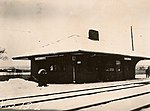Alewife Brook Reservation
1900 establishments in MassachusettsAC with 0 elementsArlington, MassachusettsGeography of Cambridge, MassachusettsMassachusetts natural resources ... and 6 more
Mystic RiverParks in Middlesex County, MassachusettsProtected areas established in 1900Somerville, MassachusettsState parks of MassachusettsTourist attractions in Cambridge, Massachusetts

Alewife Brook Reservation is a Massachusetts state park and urban wild located in Cambridge, Arlington, and Somerville. The park is managed by the state Department of Conservation and Recreation and was established in 1900. It is named for Alewife Brook, which was also historically known as Menotomy River (the village of Menotomy is now Arlington), a tributary of the Mystic River.
Excerpt from the Wikipedia article Alewife Brook Reservation (License: CC BY-SA 3.0, Authors, Images).Alewife Brook Reservation
Fitchburg Cutoff Path, Cambridge
Geographical coordinates (GPS) Address Nearby Places Show on map
Geographical coordinates (GPS)
| Latitude | Longitude |
|---|---|
| N 42.396666666667 ° | E -71.143888888889 ° |
Address
Fitchburg Cutoff Path
Fitchburg Cutoff Path
02475 Cambridge
Massachusetts, United States
Open on Google Maps








